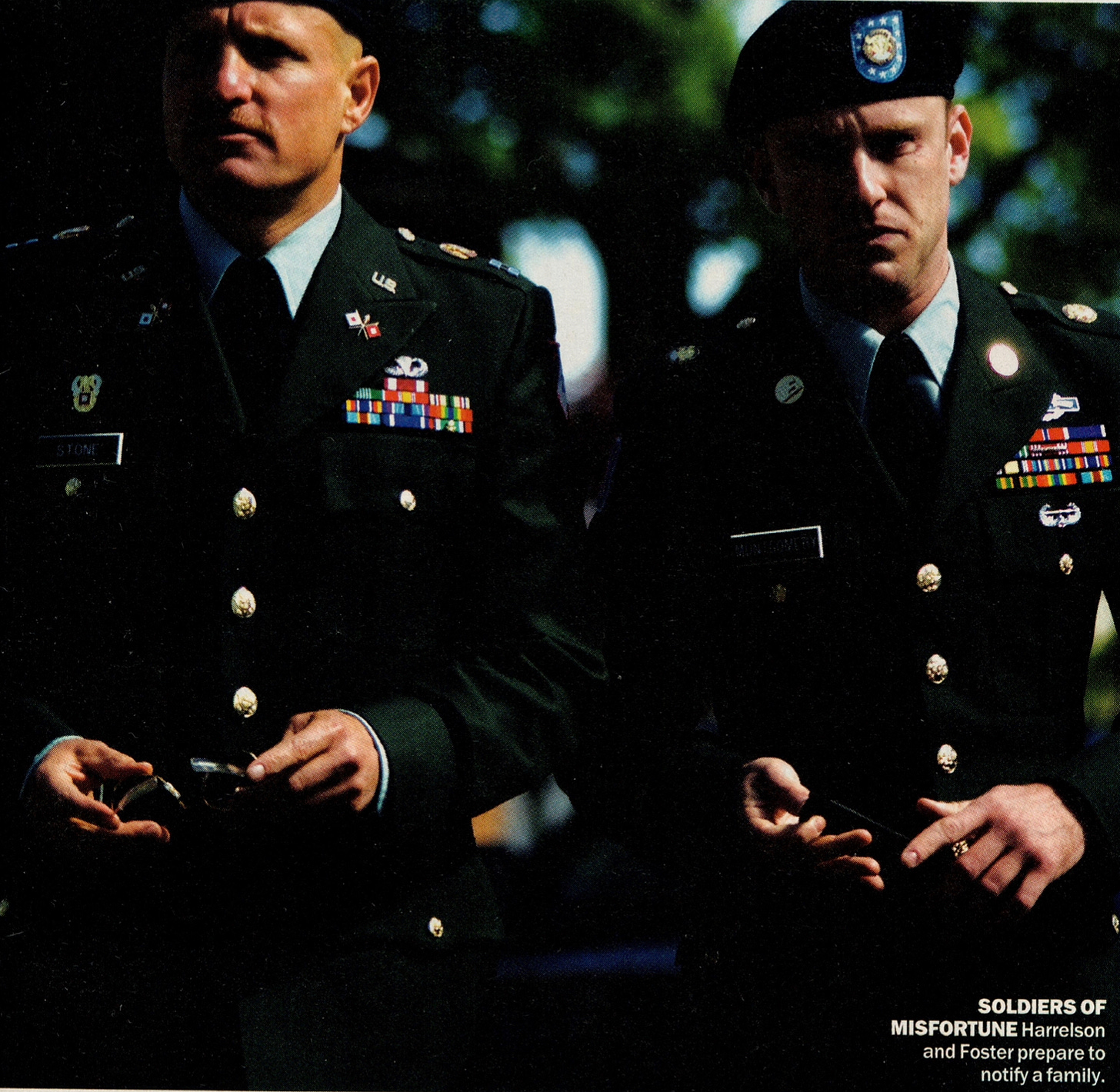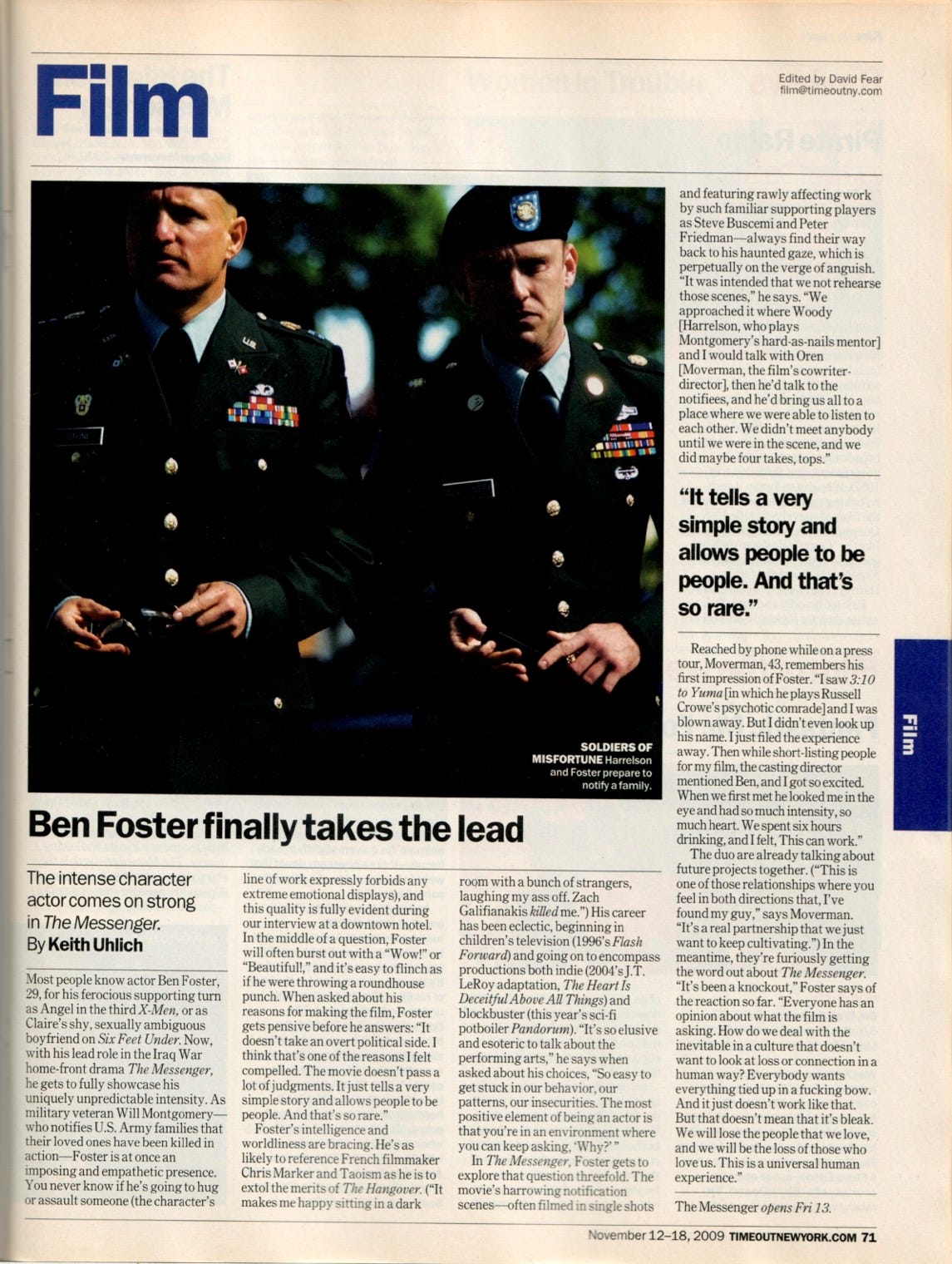Ben Foster finally takes the lead
Time Out New York Project: Issue #737, November 12-18, 2009
The intense character actor comes on strong in The Messenger. By Keith Uhlich
Most people know actor Ben Foster, 29, for his ferocious supporting turn as Angel in the third X-Men, or as Claire’s shy, sexually ambiguous boyfriend on Six Feet Under. Now, with his lead role in the Iraq War home-front drama The Messenger, he gets to fully showcase his uniquely unpredictable intensity. As military veteran Will Montgomery—who notifies U.S. Army families that their loved ones have been killed in action—Foster is at once an imposing and empathetic presence. You never know if he’s going to hug or assault someone (the character’s line of work expressly forbids any extreme emotional displays), and this quality is fully evident during our interview at a downtown hotel. In the middle of a question, Foster will often burst out with a “Wow!” or “Beautiful!,” and it’s easy to flinch as if he were throwing a roundhouse punch. When asked about his reasons for making the film, Foster gets pensive before he answers: “It doesn’t take an overt political side. I think that’s one of the reasons I felt compelled. The movie doesn’t pass a lot of judgments. It just tells a very simple story and allows people to be people. And that’s so rare.”
Foster’s intelligence and worldliness are bracing. He’s as likely to reference French filmmaker Chris Marker and Taoism as he is to extol the merits of The Hangover. (“It makes me happy sitting in a dark room with a bunch of strangers, laughing my ass off. Zach Galifianakis killed me.”) His career has been eclectic, beginning in children’s television (1996’s Flash Forward) and going on to encompass productions both indie (2004’s J.T. LeRoy adaptation, The Heart Is Deceitful Above All Things) and blockbuster (this year’s sci-fi potboiler Pandorum). “It’s so elusive and esoteric to talk about the performing arts,” he says when asked about his choices, “So easy to get stuck in our behavior, our patterns, our insecurities. The most positive element of being an actor is that you’re in an environment where you can keep asking, ‘Why?’”
In The Messenger, Foster gets to explore that question threefold. The movie’s harrowing notification scenes—often filmed in single shots and featuring rawly affecting work by such familiar supporting players as Steve Buscemi and Peter Friedman—always find their way back to his haunted gaze, which is perpetually on the verge of anguish. “It was intended that we not rehearse those scenes,” he says. “We approached it where Woody [Harrelson, who plays Montgomery’s hard-as-nails mentor] and I would talk with Oren [Moverman, the film’s cowriter-director], then he’s talk to the notifiees, and he’d bring us all to a place where we were able to listen to each other. We didn’t meet anybody until we were in the scene, and we did maybe four takes, tops.”
Reached by phone while on a press tour, Moverman, 43, remembers his first impression of Foster. “I saw 3:10 to Yuma [in which he plays Russell Crowe’s psychotic comrade] and I was blown away. But I didn’t even look up his name. I just filed the experience away. Then while short-listing people for my film, the casting director mentioned Ben, and I got so excited. When we first met he looked me in the eye and had so much intensity, so much heart. We spent six hours drinking, and I felt, This can work.”
The duo are already talking about future projects together. (“This is one of those relationships where you feel in both directions that, I’ve found my guy,” says Moverman. “It’s a real partnership that we just want to keep cultivating.”) In the meantime, they’re furiously getting the word out about The Messenger. “It’s been a knockout,” Foster says of the reaction so far. “Everyone has an opinion about what the film is asking. How do we deal with the inevitable in a culture that doesn’t want to look at loss or connection in a human way? Everybody wants everything tied up in a fucking bow. And it just doesn’t work like that. But that doesn’t mean that it’s bleak. We will lose the people that we love, and we will be the loss of those who love us. This is a universal human experience.”





